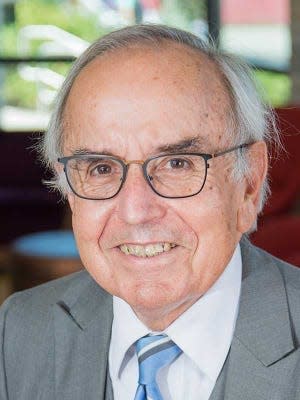Arthur Cyr: Recent summits highlight South Korea importance
- Oops!Something went wrong.Please try again later.
- Oops!Something went wrong.Please try again later.
The summit between Presidents Joe Biden of the United States and Xi Jinping of China is by definition important news, but also highlights the serious growing economic problems of the latter country. These include a collapsing real estate market and increasingly worrisome local government debt.
The meeting in September between Russian President Vladimir Putin and North Korean leader Kim Jong Un was essentially a non-event. Both nations struggle with severe economic problems, and the former with the draining Ukraine war.

By contrast, the lengthy visit last April of President Yoon Suk-yeol of South Korea to Washington D.C. underscores both the growing influence of that strong nation and the high priority of the alliance with the United States.
South Korea’s transformation has been truly stunning, and continues. As recently as the early 1960s, the nation was one of the poorest economies in the world. Still a peasant society, the entire Korean peninsula was devastated by the Korean War of 1950-53. Yet today, the Republic of Korea ranks among the top twenty economies in the world, holding leadership roles in the automobile, advanced electronics, shipbuilding and other industries.
Rapid industrialization and economic modernization are complemented by striking transition from dictatorship to democracy. President and General Park Chung-hee stifled incipient democracy and imposed extremely harsh military authoritarianism for nearly two decades.
He was assassinated in 1979 by the head of the KCIA, the national intelligence agency. In Korean memory, he remains a respected symbol of strength and effectiveness for many, though with progress and the passage of time that fades.
General Park was succeeded as chief executive by two more generals, Chun Doo Hwan and Roe Tae Woo, but growing pressure for true democratic representation proved insurmountable.
The capstone of transition to democracy was the election of Kim Dae-jung as president in 1998. He completed his five-year term without interruption, and in 2000 received the Nobel Peace Prize.
A public symbol of opposition to Park dictatorship, he was imprisoned for several years. On another occasion, KCIA agents kidnapped him and planned to kill him. Only the intervention of senior U.S. CIA official Don Gregg saved his life.
South Korea’s remarkable domestic accomplishments have unfolded while the country becomes increasingly influential in global arenas. In 2012, the Obama administration shrewdly nominated President Jim Yong Kim of Dartmouth College, who was born in Seoul Korea, as President of the World Bank.
The original vision of the United Nations combined competing goals of favoring the most powerful nations and inclusive global representation. Kim and former UN Secretary-General Ban Ki-moon personify South Korea’s significant expanding role as a bridge between developed and developing nations.
Market economies and reasonably representative governments now characterize a steadily increasing share of the world’s developing nations. In short, South Korea is positioned to lead developing nations toward prosperity.
The United Nations today is strong. UN and U.S. decisions in 1950 to defend South Korea were vital to this success. During the long Vietnam War, South Korea maintained approximately fifty thousand troops in South Vietnam. They were overwhelmingly combat forces. The principal incentive was loyalty to the United States forged during the Korean War.
President Yoon has the opportunity to develop a starring global leadership role, with noisy North Korea shunted off to stage left. At the state dinner, President Yoon sang lines from Don McLean’s 1971 song “American Pie.”
— Arthur I. Cyr is the author of “After the Cold War – American Foreign Policy, Europe and Asia” (NYU Press and Palgrave/Macmillan; Korean language edition by Oruem Publishing). He can be reached at acyr@carthage.edu.
This article originally appeared on The Holland Sentinel: Arthur Cyr: Recent summits highlight South Korea importance
